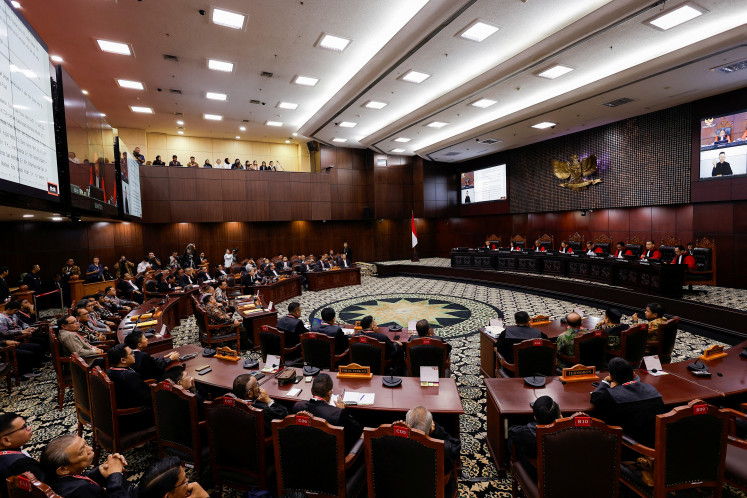The week in review: The rupiah plunge and beyond
Indonesians with disposable income flocked to money changers this week, hoping to reap the windfall of the dollarâs rise against the rupiah
Change Size

I
ndonesians with disposable income flocked to money changers this week, hoping to reap the windfall of the dollar's rise against the rupiah. For others, the upbeat faces of our leaders led to more bitterness following the fuel-price hike. If one US dollar equaled Rp 12,500, that would be good enough, said Vice President Jusuf Kalla, to considerable resentment.
But in this honeymoon period for President Joko 'Jokowi' Widodo, he can still depend on a stock of ammunition to dispel disappointment. One example is much-criticized Attorney General, Muhammad Prasetyo, who seems like he's in a race with the Corruption Eradication Commission (KPK) to investigate graft-tainted regional heads.
Current and former governors and regents from Jakarta to Sulawesi who might have thought the heat had died down around their cases have good reason to worry again.
***
This week the world mourned the death of 145 people, mostly school children, after Taliban attackers senselessly and deliberately targeted an army-run school in Peshawar, Pakistan, on Tuesday, saying that Pakistan's authorities and military would 'feel the pain' of assaults on Taliban-controlled territory and their families.
Indonesia's leaders joined the global condemnation ' but they know the main fears lie at home, of more acts of terror in the name of Islam.
Intelligence authorities have alerted us that the number of Indonesians traveling to join extreme movements in the Middle East could be in three digits, instead of around 50 as was initially believed. We are told many are traveling from Poso, Central Sulawesi, formerly a site of communal conflict. Sporadic violence following the 2002 peace accord suggests much work needs to be done in alleviating both violence and the reasons for it.
Muslims here are still traumatized by covert operations against any person or group seen to be devout or dissenting from the New Order. Many governments have trod a fine line, seeking to balance alertness and the risk of stepping on civil liberties in snuffing out potential homegrown terrorists, but Indonesia's challenge is even larger with its dominant Muslim population.
Australia's Prime Minister Tony Abbott showed such caution following the siege on a Sydney cafe occupied by a hostage taker early Tuesday. It turned out the perpetrator was a criminal with a long record of murder and violence, instead of one linked to an extreme movement ' which does not make anyone less worried about 'lone wolf' actors.
Widespread relief was felt, as the Sydney episode in which two hostages were killed was turned, by ordinary townspeople, from a potential source of Islamophobia to a movement of solidarity preventing harassment against Muslims. It displayed Australia's staunch nature of pluralism, as reflected through the hashtag #illridewithyou.
***
Ahead of the holiday season, many have nothing to celebrate. Villagers in Banjarnegara regency in Central Java have barely recovered from last Friday's landslide, in which about 100 were killed or are still missing. Warnings based, among others, on a 2006 landslide in the same area failed to prevent the tragedy.
As the rainy season is expected to continue for a few months, authorities, including disaster mitigation officials, will have to work extra hard to prevent fresh calamities.
In Jakarta, at least, officials have fewer excuses not to perform, as Governor Basuki 'Ahok' Tjahaja Purnama has installed a new deputy, Djarot Saiful Hidayat. The former regent of Blitar in East Java raises more hope of an administration focused on the improvement of the capital.
The credibility of the city's figures is the primary capital of Governor Ahok, as he expects continuous resistance to his policies, such as the new motorcycle ban on certain Jakarta thoroughfares. Of course, we would complain less if we were assured of adequate low-cost public transportation beyond the temporary measure of free shuttles in the motorcycle-free zones.
While Jakartans are anxious about expected floods, imagine the fate of villagers in Sidoarjo, East Java, where hot, smelly mud has been spewing out of the ground since 2006. Kompas daily reported that residents could not sleep during the rainy season as they had to watch out for the mud entering their homes, or risk waking up half-covered in the stuff.
Earlier, taxpayers were incensed that the owner of PT Minarak Lapindo Jaya (which first commissioned drilling prior to the mudflow), Aburizal Bakrie, who is also the embattled chairman of the Golkar Party, had been virtually freed from his responsibilities to the victims, as the Supreme Court declared the mudflow a natural, not manmade, disaster.
Aburizal nevertheless agreed to buy the land of the displaced villagers, but has declared recently that he can no longer afford the payment. On Thursday it was announced that the government would lend Lapindo Rp 781 billion (US$62 million). The uproar over state money being used again for the mudflow does not ring so loud today.
Although skeptics may say President Jokowi is trying to bribe Aburizal to lower Golkar's influence in the opposition through this latest gesture, anything possible should be done to help the 4,000 villagers end their eight-year misery.
' Ati Nurbaiti









